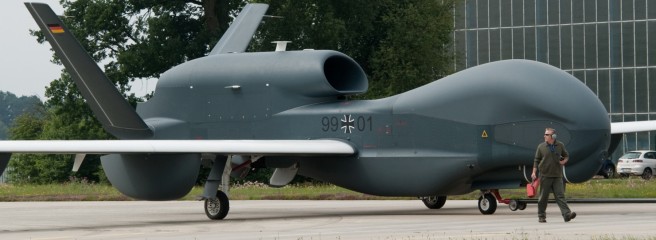
From Justyna Gotkowska, Center for Eastern Studies (Poland): Germany’s withdrawal from the Euro Hawk programme due to problems with UAVs being admitted to general air traffic may also have implications for NATO and one of its most important programmes, Alliance Ground Surveillance (AGS). The goal of the AGS programme is to enable NATO to conduct airborne surveillance operations, such as detecting and tracking stationary and moving objects in real time in any weather conditions. The AGS system will consists of five Global Hawk RQ-4B Block 40 and ground control station based in Sicily, Italy. According to the schedule, the system will achieve operational capability in 2015–2017. Fourteen countries, including Germany participate in the AGS programme, the estimated cost of which is 1.3 billion euros (Poland is planning to re-join it). The German contribution is 483 million euros. Germany also planned (no contracts have been signed as yet) to buy an additional four Global Hawk RQ-4B Block 40 with similar capabilities to NATO’s AGS.
After the cancellation of the Euro Hawk programme questions have appeared in discussions in Germany as to the possible problems Global Hawk system could have with gaining access to general airspace in Italy (certification of NATO’s Global Hawks) and in Germany (certification of the German Global Hawks). Furthermore, no uniform European legal regulations exist concerning the use of military UAVs in European general airspace. The first steps have been taken in this direction. So far, there is only one document which provides non-binding guidelines from the EUROCONTROL organisation which defines the minimum requirements, rules and criteria for flights of UAVs, including the Global Hawk system. Pursuant to this document, they should meet the same safety criteria as those applicable to manned aircraft.
As a consequence of the Euro Hawk scandal, those German politicians who deal with military issues – from the opposition (the SPD and the Green Party) and the government coalition (the FDP and even CDU) alike, are insisting that funding be withdrawn from all programmes involving UAVs. This concerns both the German contribution to the AGS programme and the German MoD’s plans to buy a further four Global Hawks. Firstly, until it becomes clear whether the UAVs will be admitted to use in general airspace in Germany. Secondly, until European regulations concerning the use of UAVs in general airspace in Europe are introduced. If the current or future German government backs these demands, this may spell a further delay in the process to achieve operational capability for NATO’s AGS system and perhaps also an increase in the costs due to the possible need to adjust the system to new European regulations. (photo: DPA) (via Judy Dempsey)
Image: dpa%205%2027%2013%20Euro%20Hawk.jpg
